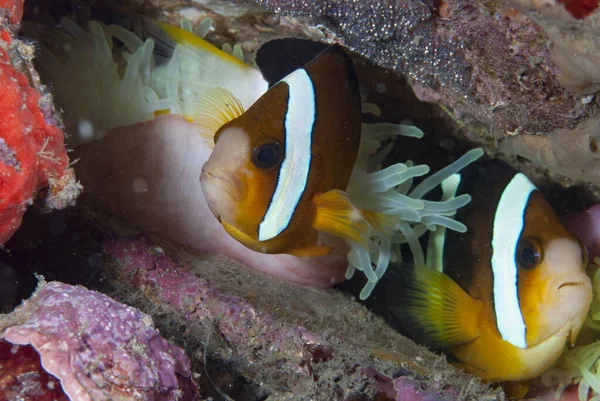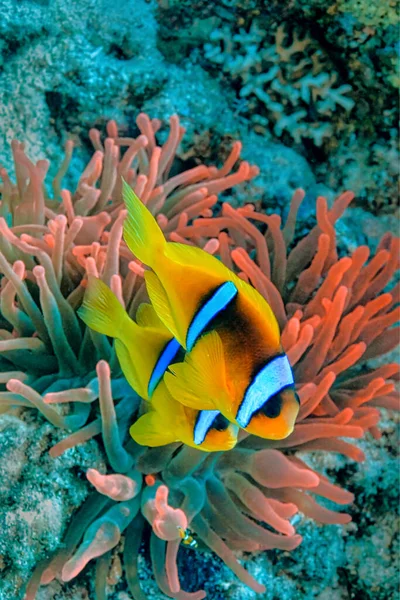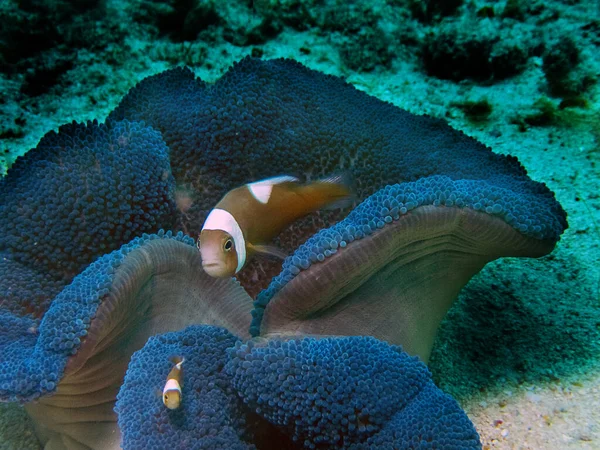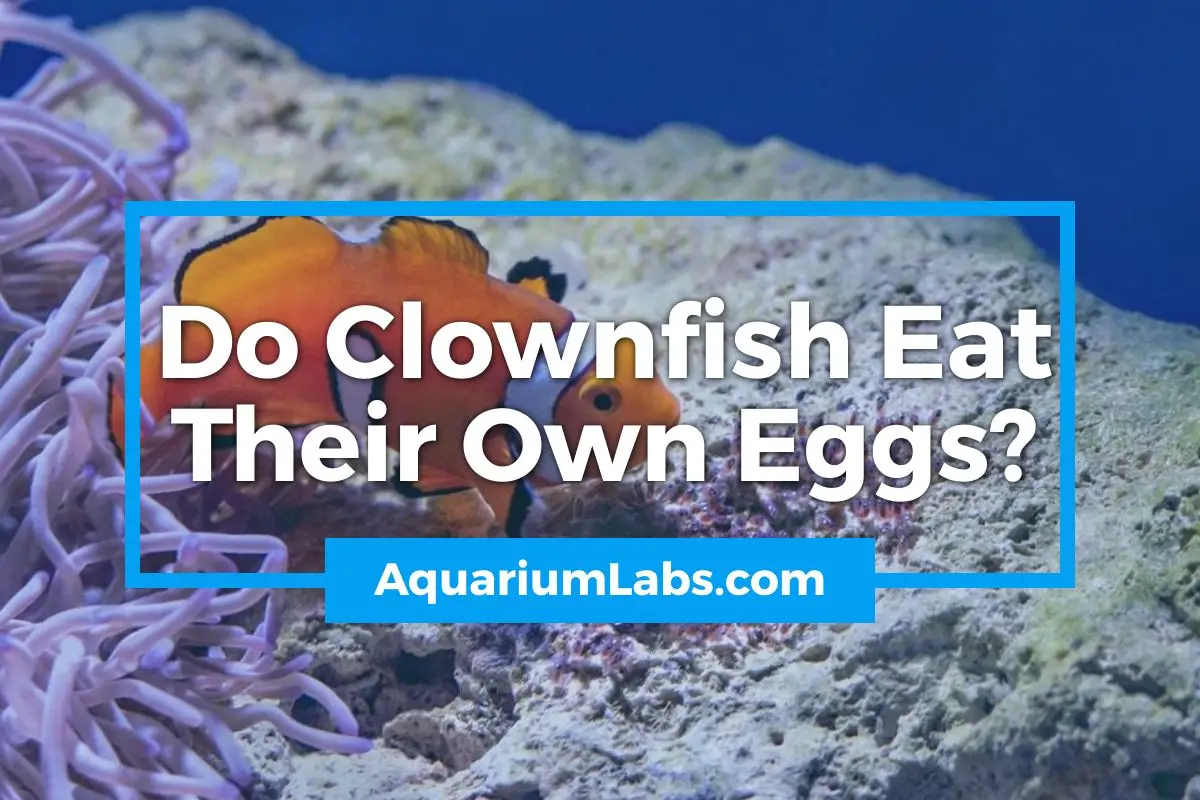Are you curious if Clownfish eat their own eggs? Are you concerned about the reduction in the number of fish in your tank and wonder if the Clownfish are eating their eggs?
This is a common question among Clownfish owners. Clownfish are demersal spawners. The parents lay their eggs on a rock or the glass wall of the aquarium.
The male then cleans and prepares the site, tends to the eggs, fans them with his fins, and uses his mouth to rasp away algae. This process also keeps water flowing through and around the clutch and deters fungi and predators.
And while the male tends to be a diligent caretaker of the clutch, sometimes, the male will become a predator and eat its eggs.
This article will tell you all you need to know about Clownfish and their eggs.
The Clownfish’s natural behavior is to eat eggs considered nonviable due to their current condition: the eggs are either unfertilized, damaged, sickly, or affected by fungal growth.
Doing this helps protect the other eggs from being killed by bacteria and fungus as these damaged eggs attract harmful bacteria.
Clownfishes are known to eat their eggs from their first few spawnings but might evolve to protect them as they spawn more.
Why Do Clownfish Eat Their Own Eggs?
Clownfish parents eat their unhealthy or damaged eggs to increase the chances of survival of healthy fry. The presence of unhealthy eggs in the clutch increases the chances that all the eggs in there will be damaged clutch and, therefore, less likely to survive.
Therefore, by eating these sick and infected eggs, adult Clownfish increase the chances of survival of healthy fry to adulthood. Despite their seemingly good intentions, there are times when adult fish might go into full feast mode and eat their entire clutch.
Factors That Make Clownfish Eat Their Eggs
Male Clownfish eat their eggs if it’s a first-time spawn or based on the factors below:

New Adult Parents
You must be prepared to lose some of your Clownfish eggs during the first few spawning. While this can be unfortunate, young and inexperienced Clownfish parents often need a few breeding cycles to get it right, so there’s a good chance that your Clownfish pair will eat their eggs.
However, you shouldn’t worry, as they’re likely to spawn again in a few weeks. They’re also likely to better protect their eggs as they grow older, so you should start seeing eggs that survive hatching.
Fungal-infected Eggs
Male Clownfish eat their eggs infected with fungus to protect healthy eggs from infection.
Poor Health of Parent Clownfish
Another cause of Clownfish eating its eggs is due to low energy. When Clownfish parents go hungry and lack calories, they’ll be tempted to eat their eggs.
Poor Tank Conditions
Poor tank conditions could also lead your Clownfish to eat their eggs based on the following two factors:
Stress
When your female or male Clownfish don’t feel safe in the tank, they might proceed to eat their eggs to regain their strength and then try breeding again when they feel better.
Stressful living conditions in the tank may arise from overcrowding. To promote undisturbed spawning, make sure you always keep the tank in top condition.
Starvation
When Clownfish are underfed and begin to compete for food, both male and female Clownfish might eat their eggs until more food is available.
There are other reasons why a Clownfish might eat its eggs, such as unfertilized eggs.
However, it isn’t easy to determine what provokes them. You can only observe them in the tank and assess the situation.
How To Protect Your Baby Clownfish

It’s often impossible to guarantee the total safety of Clownfish fry from their parents. However, keeping the parents well-fed, limiting stress, and maintaining optimal tank conditions help reduce the risk.
Eliminate Stress
Make sure you maintain adequate lighting in your tank to help limit stress and avoid overcrowding your Clownfish.
Keep Clownfish Well-fed
Underfed Clownfish tend to consider both viable and unviable ones eggs their food, so to protect your baby Clownfish and help them reach adulthood, ensure your Clownfish are adequately fed in the aquarium.
Separate Clownfish From Other Fish
Another way to protect Clownfish fry from being eaten is to keep Clownfish separated from other fish in the tank. It’s better to maintain separate tanks for the Clownfish and keep other fish in another tank.
Remove the Eggs From Their Parents
Eggs in the clutch will hatch 10 to 12 days after being laid, so it’s in the best interest of the young Clownfish to remove them from their parents before they hatch.
Once the eggs hatch, the adult male Clownfish will consider it a food source and will likely eat the fry before continuing with their breeding cycles.
Keep Eggs Oxygenated
Keep your eggs oxygenated in the nest by keeping an air stone in the tank until they hatch. However, if you have HOB in your tank, it’s advisable to keep it off to avoid sucking up the fry.
Where Do Clownfish Produce Their Eggs?

Clownfish generally stay close to the water column with anemones and will likely lay their eggs in a nest on a flat surface close to the anemones. They prefer to lay eggs in various hiding spots provided by the anemones.
How Should You Feed Your Fry?
In the first week and a half after the Clownfish hatch, you may feed them rotifers and then feed them crushed flake foods. Your fry is likely to better survive if you start feeding them rotifers rather than dry food.
Conclusion
Clownfish are likely to feed on their eggs for many reasons. Sometimes, they feed on their eggs because they’re unhealthy or infected with fungus.
They might also eat dead eggs. Another reason Clownfish eat their eggs is because it’s their first spawn. Starvation or stress are other reasons Clownfish eat their eggs.
To prevent Clownfish from eating their healthy eggs, it’s best to place them in a separate tank before they hatch, which can be done when the eggs turn a pasty shade of white.
Related Reading:
- How Many Eggs Can Clownfish Lay?
- Do Clownfish Have Teeth and Will They Bite?
- Popular Types of Clownfish
- Great Reef Safe Fish

